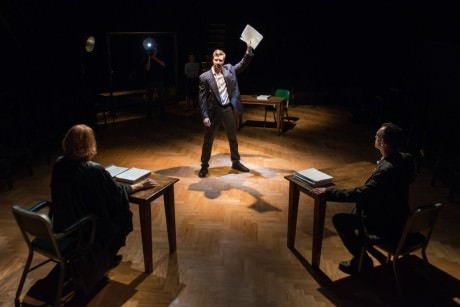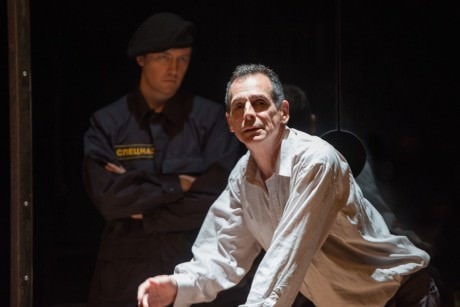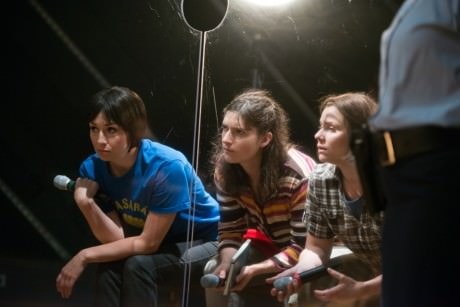Pussy Riot, punk truth tellers and guitar playing agitators and feminist rabble rousers who stood up to the Russian State and its Church affiliates under Vladimir Putin. They went into Moscow’s Cathedral of Christ the Savior and staged a demonstration against the Orthodox Church’s support for Putin; Patriarch Kirill of the Russian Orthodox Church said that they did the devil’s work. They were arrested and eventually 2 of the 5 were sent to prison for “hooliganism.”
We Are Pussy Riot by Barbara Hammond and commissioned by the Contemporary American Theatre Festival, is now being given its world premiere. It takes us into the spirit of Pussy Riot, into the wild energy and forceful violation of public spaces, into the group’s provocative language, and total disrespect for State authority.

Or at least We Are Pussy Riot attempts to do so.
The challenge is: we aren’t in Russia, and the issues that might spark a riot there, won’t spark a riot here. So, even though we can admire the performers’ dedication to their roles, and the imagination and verve they bring as an ensemble to their parts, we are nevertheless left somewhat detached from the proceedings. We might sympathize with the plight of individual rights in Russia; we might even detest Putin and his style and his results; we might even consider Russia hopelessly oppressive to women, gays, and lovers of free market capitalism; but the visceral force that is Pussy Riot will have not been felt, because the causes they fight for are realities not concepts, and their realities are in Russia. So even though playwright Hammond makes a valiant effort at play’s end to make Pussy Riot meaningful to us, that meaning remains conceptual without material, emotional force.
We remain distant spectators, even if, like myself, we might spend our lives protesting state oppression and imperialism, and unjust imprisonment, political show trials (or Grand Juries) and torture, committed in the US, by state and federal and county governments.
In other words, the problem with We Are Pussy Riots lies not in the form, but in the content.
On several occasions during the play the Pussy Rioters declare that if what we in the audience were watching weren’t theatre but a protest, then we’d be outraged, offended, or otherwise emotionally engaged.
The problem with that assertion is simple: protest–particularly the kind the Pussy Rioters do–is theatre, theatre without a ticket, theatre in the open among the people, in the public square. It is theatre that attacks the visceral issues of the day, without clever aesthetics or America’s “No Politics Allowed” rule for playwrights.
In other words, what is lacking in We Are Pussy Rioters is not the form, but the content.
If the Pussy Rioters had asserted that, like the protesters of the 1960s, that the US government was a fascistic imperial power run for the rich, by the rich, and of the rich, they might have offended a few people, which would have been evidenced by them walking out of the Marinoff Theatre.
If the Pussy Rioters had asserted that, like the “Black Lives Matter” movement that police forces all across America are becoming increasingly militarized and racist and are murdering men and women of color with relative impunity, they might have offended a few people, evidenced by angry outbursts coming from audience members as they defend the police who “have a tough job to do.”
Even if the feminist Pussy Rioters had, like Sinead O’Connor in 1992, gone center stage and torn a picture of Pope John Paul II, declaring him evil for his acceptance of child sexual abuse within the Catholic Church, they would have definitely popped a few eyebrows; but, given that that is old news today and generally known as true (unlike in 1992), the Pussy Rioters probably would not have had to go behind the producers backs to pull it off. Also, their careers would not have effectively been ruined in the US, as was Sinead O’Connor’s.

Absent a parallel protest, however, that connects what the Pussy Rioters do in Russia to what they would do if they were US citizens living in America, then We Are Pussy Riot remains an object lesson on what those bad Russians do and becomes a tame, twisted version of It Can’t Happen Here.
Hammond constructs her play around two stories: 1) the imprisonment of a history teacher named Sergey and 2) the show trial of three Pussy Rioters for the above mentioned hooliganism.
Sergey is played passionately by T. Ryder Smith. Sarah Nealis plays Anna, the doctor who is charged with caring for him. She becomes equally impassioned to save him, for Sergey is starving himself to death, as a protest against false imprisonment. Remember the Guantanamo prisoners who were starving themselves to death, demanding after a decade of imprisonment either a trial or release (they were force-fed by the US military).
Hammond elects to do the show trial as Agit-Prop theatre; in other words, it is farcical and in your face with its broad strokes and over-blown acting style. The Agit-Prop style allows her to bring in the real life testimonies of Rioters Nadya, Masha, and Katya, played with wonderful punk variety by Libby Matthews, Liba Vaynberg, and Katya Stepanov.

A large ensemble fills out the cast, playing a variety of attorneys, rioters, and even Putin himself: Cary Donaldson, Allyson Jean Malandra, Keyla McClure, and Brianne Taylor.
Someone even puts in a turn as Madonna who, in real life, lent her support and solidarity to Pussy Riot at a charity concert in New York City for Amnesty International. Ironically, back home in Moscow, Pussy Rioters were protesting the concert and Pussy Riot’s participation because tickets were sold to the event, something Pussy Riot adamantly denies itself: protesters do not earn money from performances.
Tea Alagić directs the performance, and does so with verve and skill. She uses the entire Marinoff space, from the cat walks to the lobby, and the fun never stops.
The production team also does a fine job. Sets by Peter Ksander are flexible and open to change. Costumes by Trevor Bowen are colorful and, perhaps, a bit too perfect. And lights by D.M. Wood help direct our attention.
Few would deny that we live under an increasingly powerful totalitarian apparatus of control. In Russia, Putin is the face of that State authority. In America, for large swathes of Americans, Obama is the dictator with absolute power (before him it was Bush and Cheney [Dr. Death] who welded the levers of total war). All across the world, the power of an increasingly robotic army threatens.
All across the world individuals either stage protests in churches and spend two years in prison, or light themselves on fire in the public square and cause a revolution, or lock themselves together arm-in-arm to block a highway, only to be carted off to jail.
We Are Pussy Riot brings that Russian energy to an American stage, allowing us to witness, albeit as spectators, what it means to stand-up against the oppressiveness of State power and be counted.
We Are Pussy Riot plays through tomorrow, August 2, 2015, at the Contemporary American Theater Festival performing in the Marinoff Theater – Center for Contemporary Arts/II – 62 West Campus Drive, in Shepherdstown, WV. For tickets, call the box office at (304) 876-3473/(800) 999-2283, or purchase them online.
LINK
The Playwright’s Playground – The Playmakers CATF 2015: Part 1: Playwright Barbara Hammond on ‘We Are Pussy Riot.’





